Third International Workshop on Skill Science
Associated with JSAI International Symposia on AI 2016 (IsAI-2016)
Report of SKL 2016
We held Third International Workshop on Skill Science as below:
- Date:November 16, 2016
- Venue:Raiosha Building, Keio University Kanagawa, Japan (
 access)
access) - Lines: Tokyu-Toyoko line, Tokyu-Meguro line, Yokohama Underground Green line
- The workshop is held as part of
 JSAI International Symposia on AI
JSAI International Symposia on AI
- The workshop is held as part of
- Fee:Please read the
 registration page of IsAI-2016
registration page of IsAI-2016 - Proceedings: Proceedings of Third International Workshop on Skill Science [ 37 pages
 ]. You will also receive a USB flush memory containing all the papers presented at IsAI-2016
]. You will also receive a USB flush memory containing all the papers presented at IsAI-2016 - Invited talk: Using machine learning to help manage the last mile in the application of skill science
- Prof. Randy. G. Goebel, Department of Computing Science, University of Alberta
Aims and Scope
Human skills involve well-attuned perception and fine motor control, often accompanied by thoughtful planning. The involvement of body, environment, and tools mediating them makes the study of skills unique among researches of human intelligence. The symposium invites researchers who investigate human skills and provides them with a place for exchange and discussion. The study of skills requires various disciplines to collaborate with each other because the value of skills is not determined solely in terms of efficiency, but calls for consideration of quality. Quality resides in person and often needs to be transferred through apprentice systems. The procedure of validation is strict, but more complex than scientific activities, where everything needs to be described by referring to data. We are keen to discussing the theoretical foundations of skill science as well as practical and engineering issues in the study.
Topics
We aim to invite wide ranges of investigation into human skills, from science and engineering to sports, art, philosophy, anthropology, whatever concerns cultivating human possibilities. We welcome both theoretical and practical studies of human skills. We are keen to enabling for dialogue among researchers with different backgrounds given its interdisciplinary nature of the target. We welcome contributions from practicians as well as those from theorists. The experiences and insights through practices are valuable for increasing our knowledge of human skills. We hope that the workshop will enable people to raise questions stimulating our intellectual curiosity and to induce answers worth consideration.
- Topics of our interest include the followings:
- Data collection of skills
- Dynamics of human movements
- Synchronization of motions
- Training for Skill Acquisition
- Theory of Skill Acquisition
- Visualization of skills
- Assessment of skill acquisition
- Technologies for skill development
- Field research of skills
- Applications to performances
- Examination of experience
- Meta learning
- Methods for exploring the circumstances
- Care-giving to the elderly
- Conversation skills with people with cognitive difficulties
- Coordination of players in ensemble
- Skill development by athletes
- Sharing the experience
- Interview methods
- Self observation in career development
- Interactions between fighters
- Cultivating the perception
- Coaching in sports
- Modeling of sports performance
- Rhythmical movements
- Mathematical foundation of observation
- Logical approaches to skill discovery
- Body condition while concentration
- Cultivating athletic sense
- Skill transfer at production
- Training method for sign languages
- Meaning of gestures
- Conducting an orchestra
- Teaching piano
- Drummer's skill
- Qualitative analysis of dancing
- Organization of interactions
- Philosophical issues involved in skills
- Representation of skillful movements
- Interaction between body and intelligence
- Fishers' perception
- Narrative based approach to skill study
- Analysis of skillful communication
- Analysis of Craftsmanship
- Subtle behaviors in conversation
- Meta cognition in developing skills
- Virtual reality for skill acquisition
- Micro motor skills such as typing
- Assessing individual variations
- Rhetorical structures of performance
- Co-creation in skill development
- Attitudes to skill discovery
- Tools for meta cognition of actions
- Modes of motions
- Abstraction and transfer of skills
- Robotics related to skills
- Development of acts in theatre
- Coordination between workers at hospitals
- Analysis of care work to persons in physical needs
- Cooking skills
- Social impacts of skill science
- perception-cognition skills
- Skills of video game players
- Tools for skill development
Post Proceedings
We are under negotiation with Springer Verlag for publication of Post Proceedings.
Time Table
09:40 - 10:20 Lecture_1. Prof. TsutomuFujinami
10:20 - 11:00 Lecture_2. Ms. Rie OSAWA
11:00 - 11:10 Break
11:10 - 11:50 Lecture_3. Prof. Koichi FURUKAWA
11:50 - 13:00 Lunch
13:00 - 14:00 Interactive Session
14:00 - 14:10 Break
14:10 - 14:50 Lecture_4. Ms. Khoo Er Sin
14:50 - 15:30 Lecture_5. Dr. Takuma Torii
15:30 - 15:40 Break
15:40 - 17:10 Invited Lecture. Prof. Randy Goebel
17:10 - 17:30 Closing (Reflection of the workshop)
Program
09:40 - 10:20 Lecture_1. Prof. Tsutomu Fujinami
Topics of Skill Science: Overview of ten years[ ]
]
Tsutomu Fujinami (Japan Advanced Institute of Science and Technology)
10:20 - 11:00 Lecture_2. Ms. Rie OSAWA
A Basic Study of the Influence of Auditory Stimulus on the Eye-tracking Behavior of a Driver in an Autonomous Vehicle [ ]
]
Rie OSAWA, Shota IMAFUKU, Susumu SHIRAYAMA (The University of Tokyo)
11:10 - 11:50 Lecture_3. Prof. Koichi FURUKAWA
On Clustering Cellists using Acquired Data through Performance Movies Observation [ ]
]
Koichi Furukawa (Keio University), Toshiki Masuda (Cellist), Takeshige Nishiyama (Keio Yochi-sha)
13:00 - 14:00 Interactive Session (Eight presentations)
Data mining of Care Life Log by the level of care required [ ]
]
Muneo Kushima, Kenji Araki, Tomoyoshi Yamazaki, Sanae Araki and
Taisuke Ogawa (University of Miyazaki Hospital), Noboru Sonehara (National Institute of Informatics)
Action Sports Analysis Based on Local Cross Correlation and Action Measurement Units with GPS timestamp [ ]
]
Kazunari Ishida (Hiroshima Institute of Technology)
The Information Scientific Stage Model of an Expertise in Embodied Knowledge [ ]
]
Masatoshi Yamada, Takehiko Sunako (Tokoha University), Takeuchi Yugo (Shizuoka University)
A preliminary analysis of the process on floor plan recognition -- Towards discovery of human's recognition mechanisms for complex structured images [ ]
]
Kenta Kamihori, Tomoki Shimano, Atsuto Oguro, Tomonobu Ozaki (Nihon University)
Adaptive Behavior Observed in Stepping-Over An Obstacle [ ]
]
Kentaro Kodama (Kanagawa University), Kazuhiro Yasuda (Waseda University), Kohei Sonoda (Ritsumeikan University)
Development of a system to indicate the features of the pole works in Nordic walking [ ]
]
Yuta Ogai, Shogo Miyajima, Yoshiya Mori, Masahiko Yamamoto (Tokyo Polytechnic University)
The instructional support tool for the drawing learning support system for novice learners [ ]
]
Takashi Nagai, Mizue Kayama (Shinshu University)
Identifying the underlying information in body movement used in Tea Ceremony [ ]
]
Rogelio Isaac GARZA VILLARREAL, Tsutomu Fujinami (JAIST)
14:10 - 14:50 Lecture_4. Ms. Khoo Er Sin
The effects of the theme of conversation and the place of expedition on the mental time of participants of coimagination method with expedition [ ]
]
Khoo Er Sin, Mihoko Otake (Chiba University)
14:50 - 15:30 Lecture_5. Dr. Takuma Torii
Toward a mechanistic account for imitation learning: an analysis of pendulum swing-up [ ]
]
Takuma Torii, Shohei Hidaka (Japan Advanced Institute of Science and Techonology)
15:40 - 17:10 Invited Lecture. Using machine learning to help manage the last mile in the application of skill science, Prof. Randy Goebel [ ]
]
Workshop Chair: Tsutomu Fujinami (Japan Advanced Institute of Science and Technology)
Steering Committee Members:
- Masaki Suwa (Keio University)
- Ken Hashizume (Osaka University)
- Mihoko Otake (Chiba University)
- Yoshifusa Matsuura (Yokohama National University)
- Keisuke Okuno (Riken)
Advisory Committee Members
- Koichi Furukawa (Emeritus Professor, Keio University)
Contact
skl-reg(at)jaist.ac.jp
replace @ for (at)
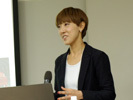
Rie OSAWA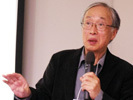
Koichi FURUKAWA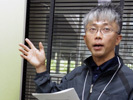
Kazunari Ishida 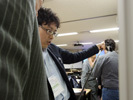
Yuta Ogai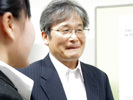
Muneo Kushima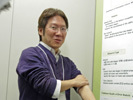
Tomonobu Ozaki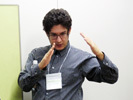
Rogelio Isaac GARZA VILLARREAL,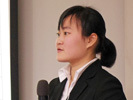
Khoo Er Sin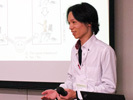
akuma Torii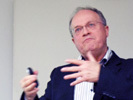
Prof. Randy Goebel

 HOME
HOME 前のページへ
前のページへ